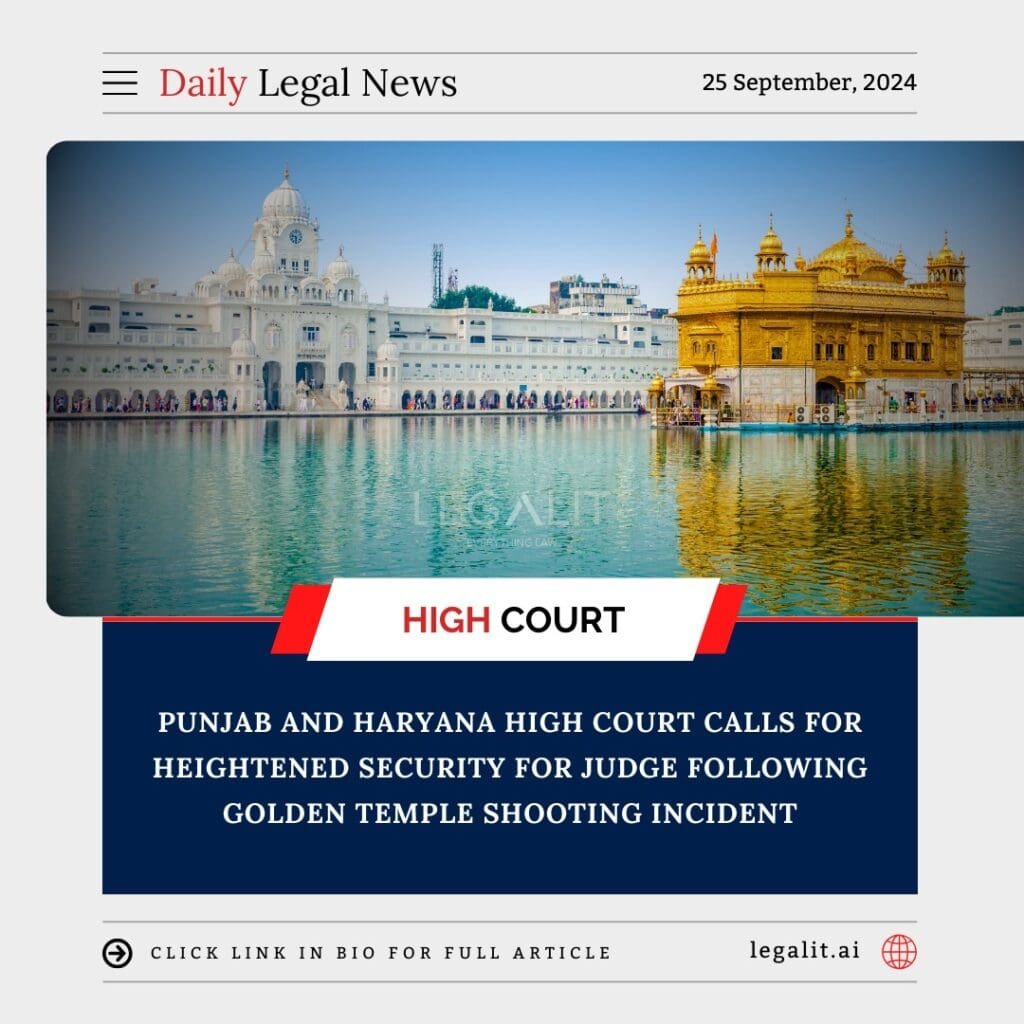
In a critical response to the recent shooting at the Golden Temple, the Punjab and Haryana High Court has called for enhanced security measures to protect the judiciary. This move was prompted by concerns over the safety of a sitting High Court judge, who had reportedly received threats following the tragic event. The court has underscored the importance of maintaining the security of judicial officers in light of rising security concerns, particularly after the attack that shook the region.
1. The Golden Temple Shooting Incident
The shooting incident at the revered Golden Temple in Amritsar had not only caused shockwaves across the Sikh community but also raised questions about law and order in the state. The sacred site, known for its historical and religious significance, has always been a symbol of peace and unity. The shooting, however, disrupted the tranquillity, leading to heightened security concerns and calls for action.
2. Threats to the Judiciary
Reports have emerged that a Punjab and Haryana High Court judge, who had been presiding over sensitive cases, received threats following the shooting. The nature of these threats has not been fully disclosed, but they have prompted an immediate response from the judicial system. Judges, who are often involved in high-profile and controversial cases, are particularly vulnerable to intimidation and violence. This situation has led the High Court to request additional protective measures for its judges.
3. Court’s Directives for Enhanced Security
The Punjab and Haryana High Court has taken swift action, directing the state authorities to bolster the security arrangements for judicial officers, especially those handling high-stakes cases. The court’s order highlights the need for a comprehensive review of security protocols for judges, particularly in cases where they are exposed to public scrutiny or controversy.
The directive calls for increased surveillance, personal security for judges, and tighter protection at court premises. This decision aims to ensure that judicial officers can perform their duties without fear of retaliation or harm, thereby safeguarding the integrity of the justice system.
4. Importance of Judicial Independence and Safety
The call for enhanced security comes at a time when judicial independence and the safety of legal professionals have been under the spotlight. The judiciary plays a vital role in upholding the rule of law and ensuring justice is served without bias or fear. Threats to judges, whether due to political, communal, or criminal elements, can undermine the very fabric of the legal system.
By ensuring the safety of judges, the High Court reaffirms its commitment to protecting the judiciary from external pressures, allowing them to adjudicate cases impartially. Judicial officers are at the forefront of critical decisions that impact society, and their security is paramount to preserving the rule of law.
5. State’s Responsibility in Ensuring Safety
The Punjab and Haryana state governments have been directed to take immediate steps to address the security concerns raised by the court. In response, authorities are expected to deploy additional security personnel, review threat assessments, and take proactive measures to prevent any potential harm to judges.
This move also places a significant onus on law enforcement agencies to ensure that incidents like the Golden Temple shooting do not escalate into broader threats to public officials. The shooting has already raised alarm bells about security vulnerabilities in high-profile public spaces, and now the focus is on ensuring that judicial officers are not targeted as a result of the incident.
6. Wider Implications for Judiciary Security
This case also sheds light on the broader issue of security for judicial officers across India. With judges frequently handling sensitive cases involving political figures, criminal syndicates, and communal disputes, the need for robust security protocols is more pressing than ever. Courts across the country may now reassess their security arrangements, particularly in light of this directive from the Punjab and Haryana High Court.
The legal fraternity has long called for better protection for judges, especially in cases where their rulings may provoke backlash. This incident serves as a stark reminder of the risks that judicial officers face and the urgent need to shield them from harm.
7. Conclusion: Strengthening the Judicial System
The Punjab and Haryana High Court’s directive for enhanced security following the Golden Temple shooting highlights the judiciary’s resolve to protect its officers amidst growing concerns over their safety. In an environment where threats to judicial independence are increasingly visible, this move underscores the court’s dedication to maintaining the security and integrity of its judges.
Ensuring the safety of the judiciary is not just a matter of protecting individuals, but a crucial step in safeguarding the justice system as a whole. The state’s response to these directives will be pivotal in setting a precedent for how security threats against the judiciary are managed in the future.